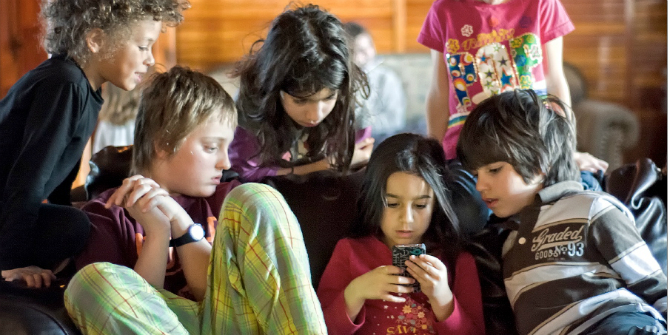 How do parents’ attitudes to social media use by their children change across socioeconomic classes in India? After conducting ethnographic fieldwork in Panchagrami, South India, Shriram Venkatraman discusses his findings about aspirations for social mobility, perspectives about social media, and differences between the higher and lower socioeconomic classes. Shriram has a PhD from University College London and currently with IIIT-Delhi, explores parents’ attitudes to social media use by their children, based on their socioeconomic class. [Header image credit: Author]
How do parents’ attitudes to social media use by their children change across socioeconomic classes in India? After conducting ethnographic fieldwork in Panchagrami, South India, Shriram Venkatraman discusses his findings about aspirations for social mobility, perspectives about social media, and differences between the higher and lower socioeconomic classes. Shriram has a PhD from University College London and currently with IIIT-Delhi, explores parents’ attitudes to social media use by their children, based on their socioeconomic class. [Header image credit: Author]
A child’s use of social media is a controversial topic. There are several facets to this, and most differ by region and culture, even in a globalised world. Regional differences are complex and multilayered, influenced not just by how children view social media, but by the opinions of the various interested parties in the child’s future, such as parents, nearest kin, teachers, school systems etc. and each are, in turn, influenced by the socioeconomic landscape in which they are embedded. This was apparent from the research conclusions of the ‘Why We Post’ project, where nine ethnographers looked at the impact and consequences of social media in the everyday lives of people in eight countries.
This post explores how the parents of young schoolchildren view their children’s participation on social media, and how their socioeconomic class influences them.
Panchagrami, a peri-urban area next to the city of Chennai in Tamil Nadu, South India, is where I conducted ethnographic fieldwork for 15 months. It is fast transitioning from a rural to an urban landscape owing to decade-long developments in the IT sector. As it transforms from an agricultural to a knowledge economy, residents belonging to different socioeconomic groups are competing with each other to make use of the newly available economic opportunities offered by the IT sector.
IT as a means of social mobility
For the lower socioeconomic class, the word ‘IT’ symbolises development and prosperity, and gaining employment in an IT company signifies social mobility. This aspiration for social mobility is reasserted on a daily basis by material symbols that abound in this area, like upscale housing, swanky office buildings, formal office wear clothing and even tech gadgets such as laptops and smartphones.
Parents aspire to attain social mobility through their children, who they provide with an affordable school education to help them secure good grades and move on to doing courses that will lead to jobs in IT. Their children are also provided with computers, which to the parents signifies knowledge. Interestingly, accessing the internet and social media sites such as Facebook through these computers is further proof for the parents that their children are on the right path to attaining technical competence and thus, social mobility.
Take Satish, a plumber, and his wife, Sheela, a housemaid who works at one of the multi-storeyed apartment complexes. As long-term residents of this area, they have witnessed its recent transformation. Sheela quips:
My husband and I don’t know what IT is, but look at these young people, they look affluent, wear nice clothes and they work in air conditioned offices all day, not like us who suffer the brunt of the Chennai heat. Kiruba [their son in the 9th grade] should work in comfortable air conditioning, wearing nice clothes and get paid a lot of money… I want to see him travel in a car… I will do anything for it.
Their aspiration for their son translated into them buying him a second-hand HP laptop and a dongle for internet connection. He has a cheap Samsung smartphone with a pre-paid internet data pack, which also enables him to access WhatsApp. His parents see Kirubakaran’s membership of Facebook and WhatsApp as an opportunity to participate and network in the wider world, an opportunity that wasn’t available to them. When Kirubakaran shows new Tamil films to his parents on sites such as YouTube, they perceive this as their son achieving technical competence. They don’t differentiate between the internet and social media, which signify the same thing for them, namely, knowledge and a promise of social mobility.
IT as a path to a secure future
Similar to the aspirations of the lower socioeconomic class, middle-class and upper-middle-class families also aspire for a secure future for their children, although this translates to competing transnationally. This involves allowing their children access to smartphones and other tech gadgets, and sending them to the right schools that offer exposure to the latest developments around the world through the ‘smart classroom’ facility. However, although their children are on social media sites such as Facebook, WhatsApp, Twitter and Instagram, these aren’t seen as signs of technical competence; rather, they are viewed as distractions. Only YouTube and a few other sites are accorded a status of being ‘truly educational’.
Take Prahlad, a director in an IT firm, and his wife, Sowmya, a homemaker. While they are happy that their son, Avinash, a grade 10 student, and daughter Keerthi, a grade 8 student, access social media after school hours on both their laptops and smartphones, their constant access to social media troubles them. Prahlad is vocal about his concerns:
They don’t understand how competitive the world is, no one is going to get Avinash a college seat just because he knows how to access Facebook … it’s fine as a hobby, but not as a full-time occupation… Keerthi is also into this … if it’s Facebook and WhatsApp for her brother, it’s WhatsApp for her … each spoil the other and in turn spoil their futures too … they just don’t listen to Sowmya or me.
While the internet and YouTube still signified knowledge, social media such as Facebook was seen purely as entertainment.
Conclusion
Although the scales of aspiration for social mobility for parents in both socioeconomic groups are different, intergenerational attainment through their children is something that parents, irrespective of socioeconomic class, aspire to. However, the proof that they seek in order to ensure that their children are fulfilling their aspirations is different. For parents from the lower socio-economic class, social media is the manifestation of the promise of social mobility; for parents from the upper middle class, social media is merely a distraction to attaining social mobility.
The findings at Panchagrami, agree with an important discovery of the larger ‘Why We Post’ project, i.e. “For some people social media does not detract from education – it is education”. Though, socio-economic class differences played a significant role in how social media was perceived in most of our fieldsites, this becomes especially noteworthy at Panchagrami, given the nature of the fieldsite, which lends itself to a possible diachronic study which could then examine if the perspectives of the current lower socio-economic class about social media and education change as they attain social mobility to become an emerging middle class.





